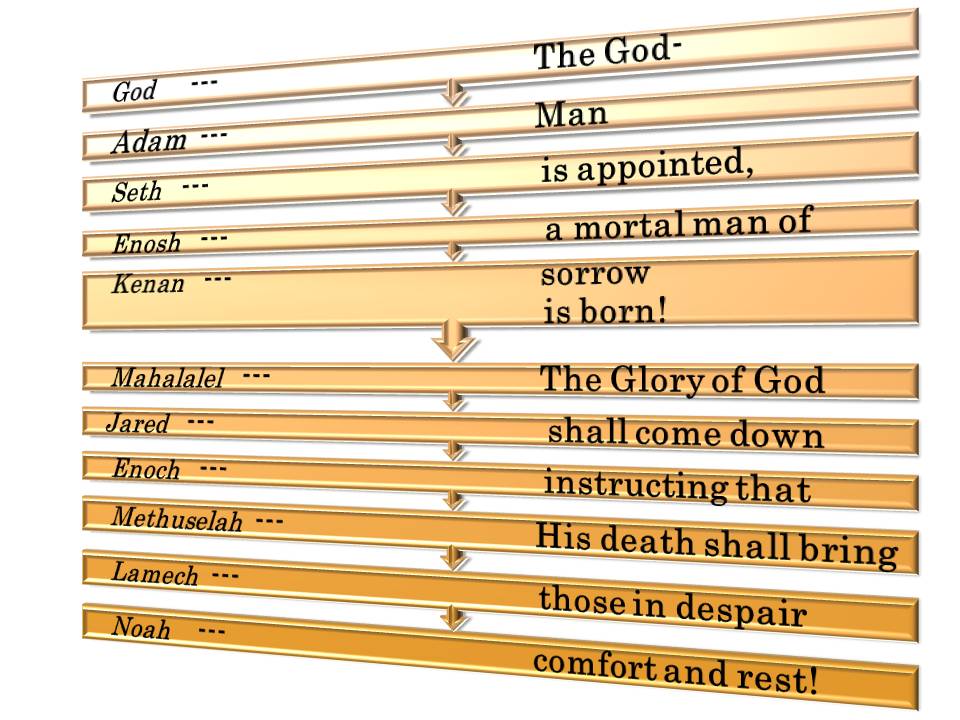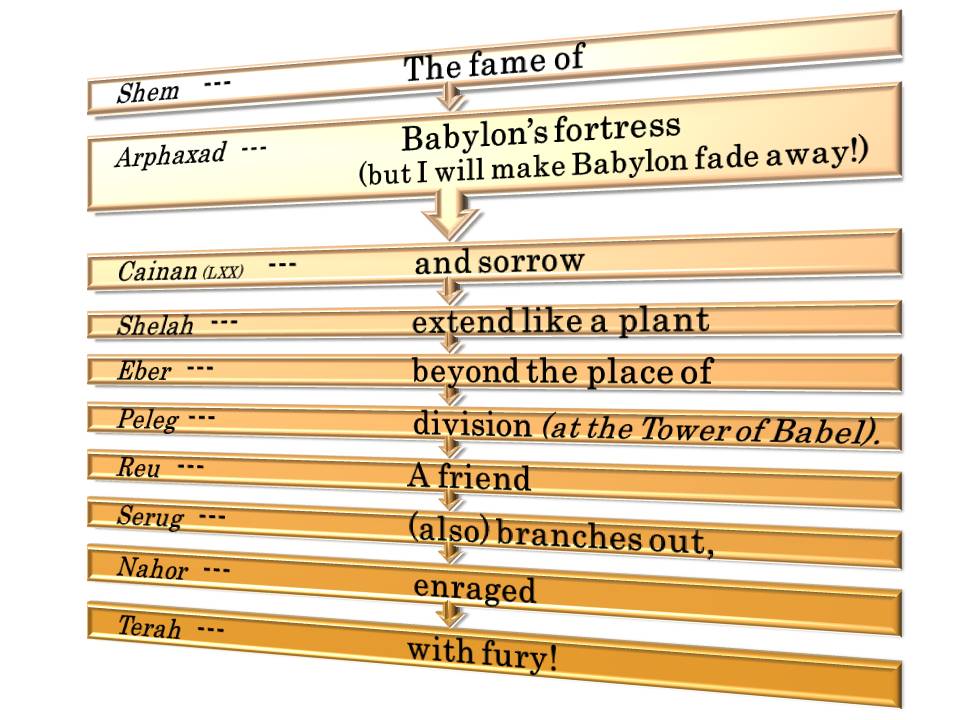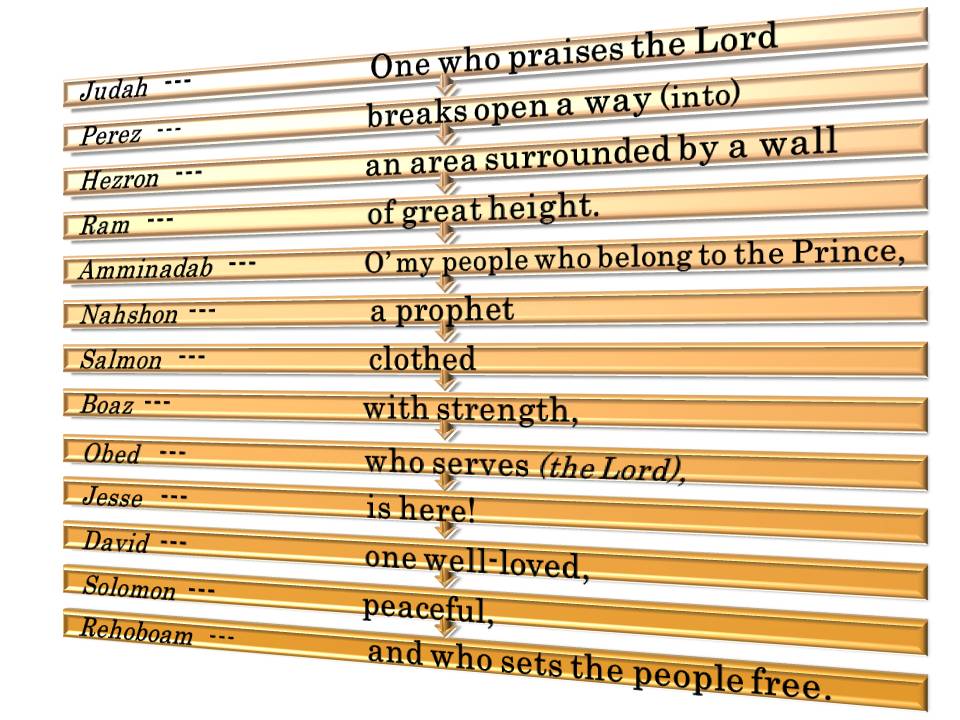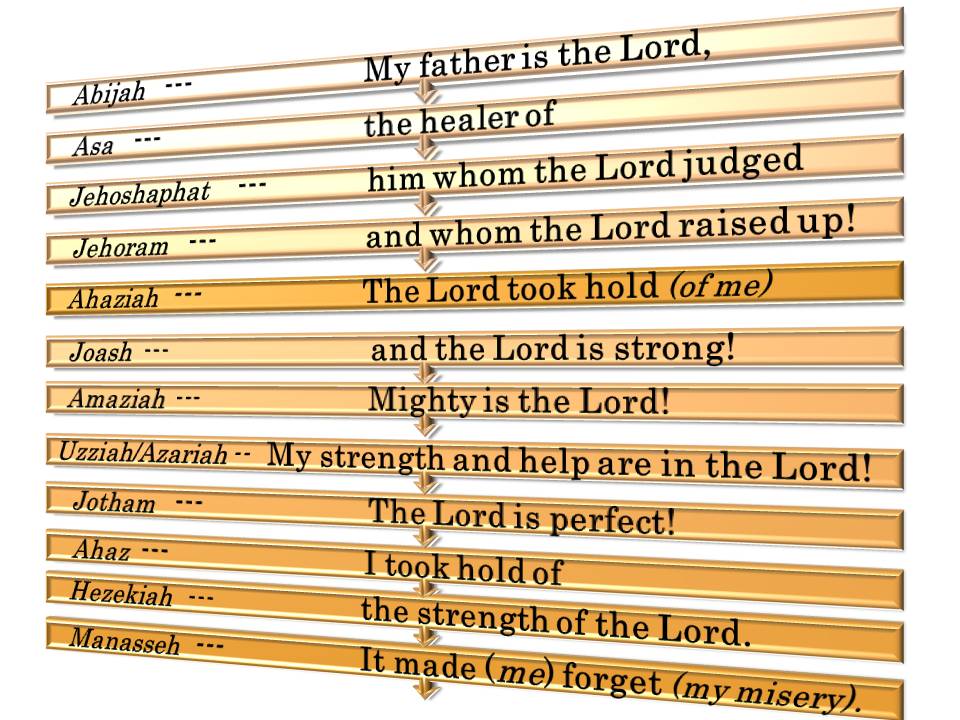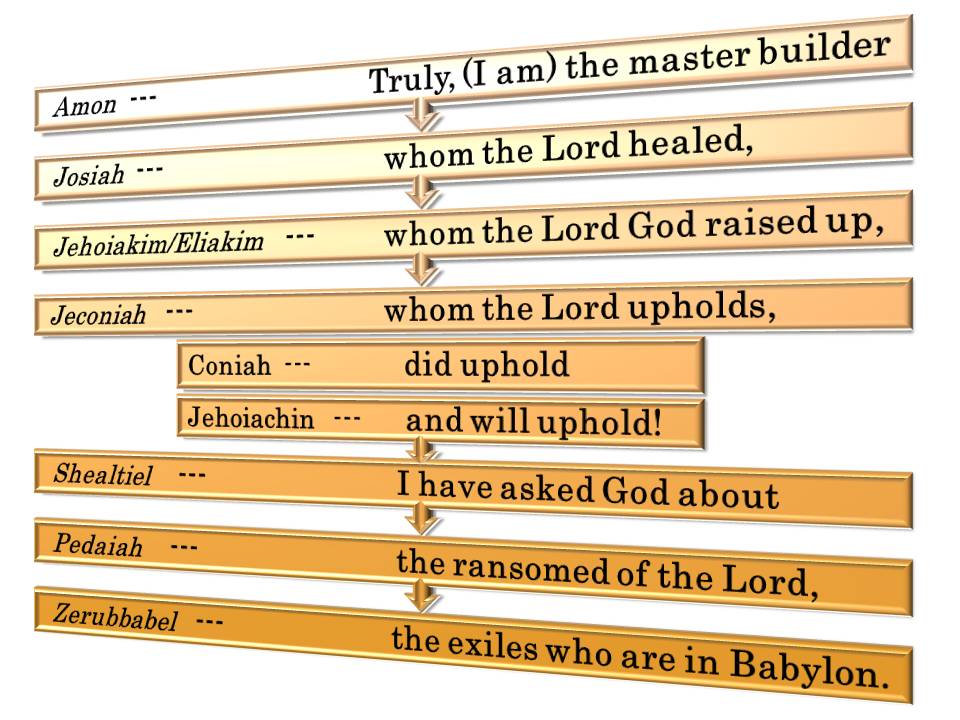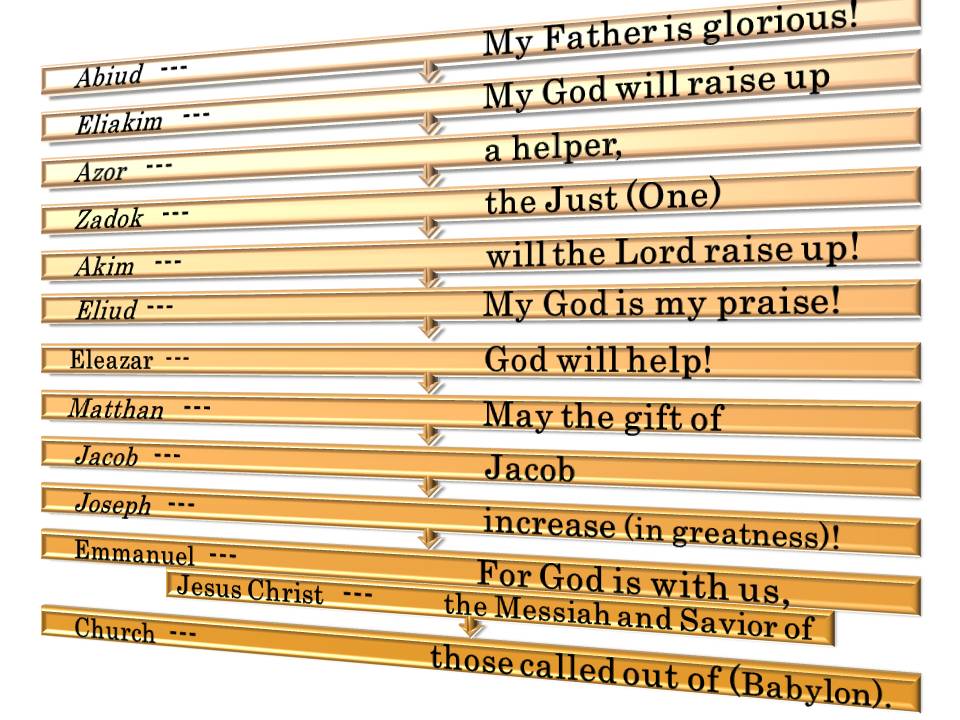Prophecy in Genealogy
Prophecy emerges when the meanings of all 72 names in the genealogy from Adam to Jesus are read sequentially
Prophecy in Genealogy
What we view not as bible fact was once viewed as prophecy - has when it was written it hasn't happpend yet. Now we know it was prophecied and it was fullfilled and it has happened.
For many years people have found the geneologies 'boring' and an unneccesary part of the bible. More and more we realise that every word in the WORD of GOD is there for a reason, nothing is by chance. An awesome prophecy emerges when the meanings of all 72 names in the genealogy from Adam to Jesus are read sequentially!
The meaning of a name was very important in bible days. Sometimes the bible itself informs the reader what a name means. Famous biblical persons such as Adam, Cain, Seth, Noah, Abraham, Isaac, Jacob and his 12 sons, all have the meaning of their name explicitly given in the bible. Their names tell the story of why, when or how they were born.
Some have wondered whether these names (with their meanings) were intended by God to be strung together in succession to tell some larger story. Already there have been attempts to string together the first 10 names in the bible from Adam to Noah. In general, this is what the first 10 names of the bible read when the meaning of each name is rendered in the same order given in the bible.
"The God-man is appointed; a mortal man of sorrow is born!" "The Glory of God shall come down and teach that His death shall bring the grieving comfort and rest."
1. The Promise to Fallen Man
(Jesus is called, "The Glory of God", in 2 Cor. 4:6.)
2. Both Evil and Hope Branch Out Like a Plant
(The "friend" of the downtrodden is angry)
3. A Mighty Father and a Prince, Who Save a People
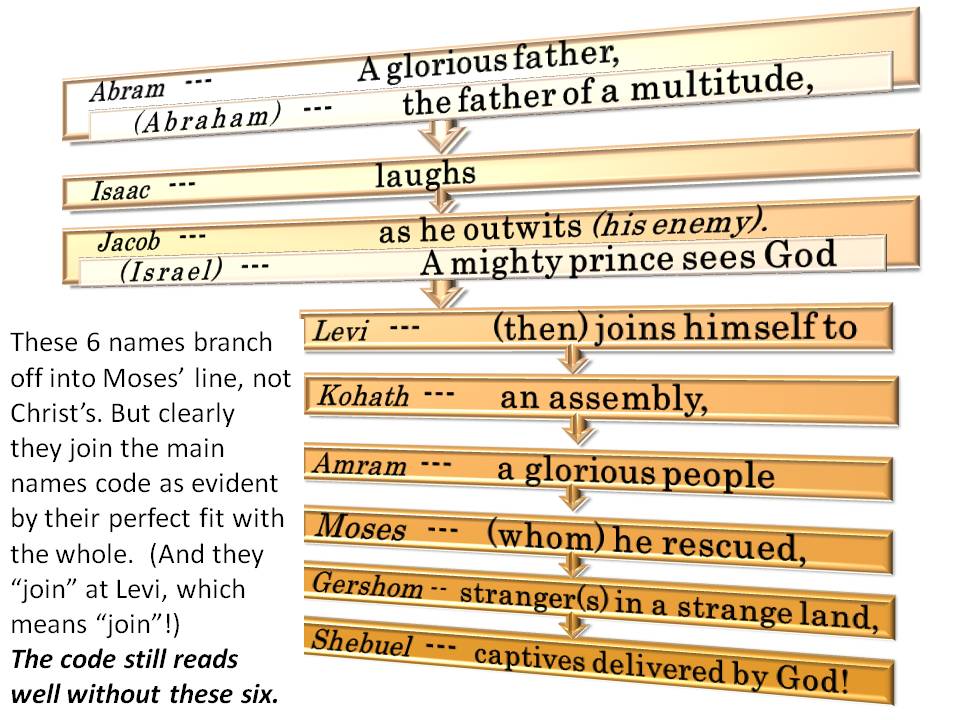
4. The Prince Described, and His Mission
5. The Son Relies on His Father to Raise Him Up
6. The Son Identifies Himself as Co-Creator
The Son Prays to His Father For Help
7. The Son Praises His Father For Help
Concluding Blessing upon Messiah and His People
Adam to Abraham Acrostic:
Another type of bible code has also been recently discovered. It occurs within the first 20 names from Adam to Abraham and confirms the names code. The first letter of each consecutive name from Adam to Moses in the original Hebrew forms an acrostic. It is clear by the what this acrostic-prophecy says that the reading is meant to be affixed to the Bible-Names Code.
The Promise of Forgiveness
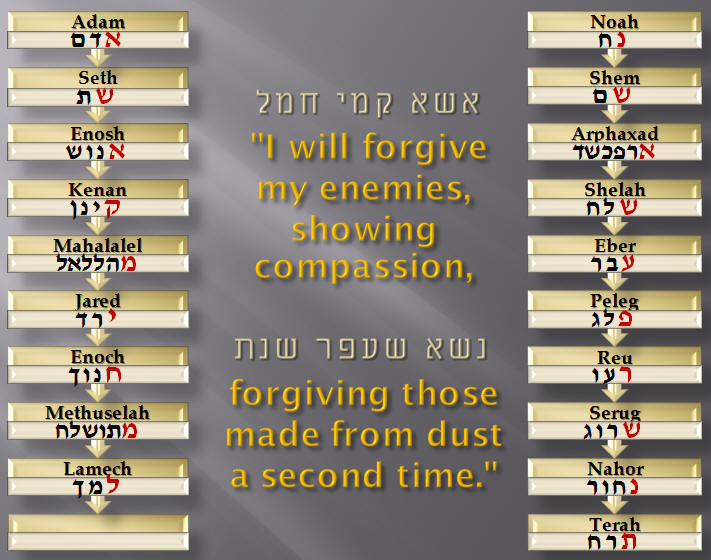
Meaning of Names from Adam to Christ Strung Together
The genealogy of Jesus portrays key biblical events as they unfolded through the ages, while at the same time foreshadowing Jesus Christ.
The Promise to Fallen Man
The God-Man is appointed; a man of sorrow is born!
The Glory of God shall come down from heaven and teach men that by means of His death He shall bring comfort and rest to those who mourn.
Both Evil and Hope Spread Like a Plant
The fame of the stronghold of Babylon, and sorrow, extend their borders like a plant beyond the place of division (at the Tower of Babel).
-- But I will make Babylon fade away! ---
The "Friend" of the Righteous is Angry at the Wicked
A friend also branches out, enraged with fury!
A Mighty Father and a Prince, Who Save a People
A glorious father, the father of a great multitude laughs as he outwits (his enemy). A righteous prince sees God!
A mighty-one fights! {He joins himself to an assembly, a glorious people whom he rescued, stranger(s) in a strange land, captives delivered by God!"}
(See notes for bracketed portion)
The Prince Described, and His Mission
One who praises the Lord breaks open a way into a safe place that is surrounded by a high wall.
O' my people who belong to the prince, a prophet clothed with strength, who serves (the Lord), is here!
Out of love, this beloved one paid the price for peace in order to set the people free.
The Son Relies on His Father to Raise Him Up
My Father is the Lord, the healer of him whom the Lord judged and then raised up.
The Lord has taken hold of me and the Lord is strong! Mighty is the Lord! My strength and help are in the Lord! The Lord is perfect! I took hold of the strength of the Lord and it made me forget my misery.
The Son Identifies Himself as Co-Creator
Truly, (I am) the Master Builder whom the Lord God healed, whom the Lord raised up, and whom the Lord upholds, did uphold and will uphold!
The Son Prays and Praises His Father For Help
I asked God about the ransomed of the Lord --- those exiled in Babylon.
My Father is awesome! God will answer by raising up a helper, the Just One will the Lord raise up! God is my praise! God is the One who helps.
Concluding Blessing upon Messiah and His People
May the Gift of Jacob increase in greatness, for God is with us --- the Messiah and Savior of those called out (of Babylon).
=======
Adam-to-Abraham Acrostic:
"I will forgive my enemies, having compassion, forgiving those made from the dust once again."
For a DEEPER study on this subject
The Genealogy Follows the Gospel of Matthew (ch. 1),
coupled with Gen. 5, Gen. 11, (Luke 3)
Luke has 77 names ---the number of forgiveness --- from Jesus to Adam "the son of God". The names after David differ from that of Matthew's genealogy due to another method of tracing the lineage of Jesus. Interestingly, these names recorded by Luke (from "David" on) do not form a names-bible-code as does Matthew's list, but when attempted reads as gibberish. This only underscores the miracle of Matthew's list of names.
Nor can it be said that Matthew deliberately invented these names in order to artificially create this code because it is Matthew (not Luke) who follows the names of the kings of Judah as recorded in the Old Testament centuries before Matthew was born.Only the last 10 names in Matthew's genealogy are not found in the Old Testament. This is because the Old Testament ceased to be written during that period. Thus, only about one-eighth of the names in the Names Bible Code are supplied to us by Matthew while the rest are already found in the Old Testament.
And if we say that the numerous Old Testament writers somehow over a period of hundreds of years conspired to create the Names Code, then we are still left with a prophecy about Jesus the Messiah written hundreds of years before he was born. How much more logical to simply accept this code as a miracle of God!
The Names Code is based upon Mathew's distinct genealogy, most of which are also found in the Old Testament. Matthew lists 60 names from Adam to Jesus when we complete it back to Adam, and 65, if the extra five names are added that Matthew excluded. Some individuals had more than one name and these are also included in the code. Therefore, there are 65 separate individuals in Jesus ancestry, but 72 different names because some individuals went by more than one name, and the code utilizes all names. (For example, Jacob was also named Israel.)
However, the Names Code uses 80 names in all because the genealogy is bracketed by two others. It includes "God" at the beginning of the genealogy, (Adam is called, "The son of God", Luke 3:38), and it includes the "Church" at the end. And there are six extra names that branch off into Moses' line that we optionally include, but the code reads fine without it. (See notes for why the inclusion.) Thus, 72, plus two, plus six, equals 80 names in all. But there is still only 65 actual people in Jesus' genealogy. (Click here for the meaning of all these numbers.)
King David is at the exact middle of the genealogy, which is interesting because the bible calls Jesus, "The Son of David" nine times and "The Son of Adam (man)" בן־אדם 88 times. Jesus is linked to King David and Adam more than any other in his ancestry.
We have numbered the following according to Matthew's reckoning, except we include the five missing names, here listed are #39a, 39b, 39c, 46a, 48a. The omitted people in Matthew's genealogy are nevertheless recorded for us in the Old Testament. Thus, the following represents the complete list of names found in the bible, from Adam to Jesus; from Creation to Christmas!
|
#
|
Names
(Numbered according to Luke's genealogy.) |
Literal meaning of names "And", "but", "of", "the", "is/are" are included in the meaning as mere connector words. Other additions are bracketed. |
Notes and Possible Meanings
The notes concentrate on the more difficult meanings. The names for the "Lord" in Hebrew are "Jah", short for "Jehovah" ("Yahweh"). |
|
0 |
The God- |
"God", (Hebrew, "The God", "HaElohim"), from the word meaning, "to be strong/mighty". Luke's genealogy begins with Jesus as "the son of God" (Luke 3:22), and ends with "Adam, who was the son of God", (Luke 3:38.) |
|
|
1 |
Adam |
Man |
"Man"; "Mankind" (Comes from the word meaning, "to be red", as in the red earth [or, red blood?]. But the word itself is used hundreds of times in the Hebrew bible to simply mean "man", Gen. 2:5, 5:1,2, Lev. 22:5.) |
|
2 |
Seth |
is appointed; |
"Appointed", "placed", "put"; "compensation", "to replace". |
|
3 |
Enosh |
A (mortal) man of |
"Man"; "mortal/frail man". |
|
4 |
Cainan |
sorrow (or, "is born"!) |
“Possession”, "owner", "one acquired", "brought forth", "begotten"; "spearman"; "smith"; but sounds like, and may be related to the word for a 'dirge' or a 'wailing chant', hence "sorrow". (See #12a. Also see endnotes for names as puns.) (See Gen. 4:1, likely same root as parallel name of "Cain".) The first four names also together may read: "A man is appointed, a mortal man is begotten ('is born')." Compare this with Isa. 9:6, "For unto us a child is born, unto us a son is given; and the government shall be upon his shoulder: and his name shall be called Wonderful, Counsellor, Mighty God, Everlasting Father, Prince of Peace." |
|
5 |
Mahalalel |
The Glory of God |
“The Praise of God”; "The Fame of God"; "The Glory of God"; "The Blessed God". (The messiah is "the Glory and Praise of God", Heb. 1.) Note the contrast of the fame/Glory of God here with the fame of Babylon in #11-12. Also, #5-10 is being contrasted with #11-15. |
|
6 |
Jared |
shall come down |
“Coming down". (See note #25.) |
|
7 |
Enoch |
instructing that |
“Initiated”; "dedicated", "teacher". Strongs says, "A primitive root; properly to narrow; figuratively to initiate or discipline: - dedicate, train up." |
|
8 |
Methuselah |
His death shall bring |
“Man of the missile/dart”; Sounds like, "His death shall bring". The latter reading is the more obvious (though not according to etymology) in that "His death brought" the flood; that is,Methuselah died just weeks before the flood. Nevertheless, even the name "Man of the dart/spear" suggests the type of death that Messiah would die, for "He was pierced for our transgressions," (Isa. 53). Also compare Methuselah to his ungodly counterpart, Methushael, which sounds like, "His death is of God," and likely literally means, "A Man who is of God". (See next chart and also endnotes.) The two similar sounding names help decipher the intended meaning in the code because in both lists the idea of "His death" is present and fits the context. |
|
9 |
Lamech |
those sinking down in despair |
"Grieving", "poor"; "the strikerdown", "overthrower"; "the wildman"; "a strong youth"; "powerful". These are all possible meanings, but none are certain. What is for sure, however, is that the name sounds like the Hebrew phrase, "Lamoch", meaning, "To sink down in despair", and so it is rendered here. (Also see endnotes for names as puns.) The name also sounds like, "Concerning him who was smitten"; see Psalm 136:10. |
|
10 |
Noah |
comfort/rest. |
"Rest"; "to comfort". |
|
11 |
Shem |
The fame of |
"Fame", "Name". |
|
12 |
Arphaxad |
the stronghold of Babylon and its boundary --- but I will make Babylon sink down and fade away! --- |
"Stronghold of Babylon"; "Boundary of Babylon"; "Wall of Babylon"; "(City of) Ur of Babylonia/Chalidees" "Healer/Releaser". Sounds like, "I will abandon Babylon"; or, "I will make Babylon sink down/fade away", or, "He cursed the breast". This is a key name, and nearly all the possible meanings fit well and have been included. While there are several different possibilities, there is increasing agreement among scholars that the name refers to Babylon in some way. (See endnote quoting from "The Jewish Encyclopedia" concerning its connection with Babylon.) This line of names that reads, "The fame and/of the stronghold/boundary of Babylon extends beyond the border/divide," ends with Peleg and this is also where the genealogy branches out into the period of the tower of Babel. Babel is also where they sought to make a "name" (fame) for themselves. Therefore, perhaps the "stronghold of Babylon," is just another name for the "tower of Babel" in Babylon. (Or may read, "I will make Babylon sink down/fade away!") I believe both are intended as a play on words, and this is reflected in the code. (Also see endnotes for names as puns. See note in #20.) |
|
a |
Cainan(?) |
and sorrow |
See #4: “Possession”; "owner"; "begotten"; "spearman"; "smith"; but sounds like, and may be related to the word for a 'dirge' or a 'wailing chant', hence "sorrow". (Also see endnotes for names as puns.) Gospel of Luke (ch. 3:36) follows the LXX version that adds the name Cainan between Arphaxad and Shelah. Though almost certainly a textual error in the LXX (a repeating of #4), yet because Luke used it so have we. However, the names code can read fine without it. (If we include Cainan, we have a total of 66 individuals from Adam to Jesus, the number of 'man'.) |
|
13 |
Shelah |
extend like a plant |
"To sprout"; "send"; "extend". |
|
14 |
beyond the region |
"The region beyond", "The other side (of the river Euphrates)", Gen. 11:31. |
|
|
15 |
Peleg |
of division (at the tower of Babel). |
"Division"; "watercourse"; "water channel"; "divide". Peleg is a play on words for many things here, including the division at Babylon, Gen. 11:9. Perhaps it is also subtle reference to the Euphrates river which acts as a border for Babylon? (See previous name.) The name carries with it the idea of a divider or division (as at Babel), as by a river. The meaning agrees with his father, Eber. Eber (region), plus Peleg (divided), means, "A region divided". Recall the events at the time of Peleg. |
|
16 |
Reu |
A friend |
"Friend". |
|
17 |
Serug |
(also) branches out, |
"Branch of a vine"; See Gen. 40:10,12. (The word denotes intertwining vine branches.) |
|
18 |
Nahor |
snorting |
"Snorting", "snoring"; "inflamed". (As a verb it is found twice in the bible. Both times it refers to the intense snorting of a horse. Job 39:20; Jer. 8:16.) In the context of the code it is understood as 'an undaunted determination stemming from fury' since the flaring of the nostrils is also associated with anger in Hebrew. See next name.) (See #19. For "blast of nostrils" see notes #25.) |
|
19 |
Terah |
with fury! (lit., "when breathing!") |
"To breathe"; "scent"; "blow"; "to delay". Though of uncertain origin, one possible meaning is, "to breathe hard", and this connects well with the previous name so that together we have the imagery of a wild horse 'snorting in anger'. (See #18. For "blast of nostrils" see notes #25.) |
|
20 |
Abram/ Abraham |
The glorious father --- the father of a great multitude --- |
"Exalted father". Abram had his name changed to Abraham, meaning, "Father of a great multitude"; "Father of many"; sounds like, "father of mercy". It is interesting that both names here are Babylonian, since Abram was called out of Babylon. Some scholars believe that Abraham derived its meaning more by what it sounded like to Hebrew ears rather than actual etymology. Some suggest that the actual etymology for Abraham means, “he loves the (his) father,” but that it only sounded like, "Father of a multitude" to Hebrew-speaking people. (International Standard Bible Encyclopedia.) But rather than speculate, we have gone by what the bible expressly says in Gen. 17:5, "Neither shall thy name any more be called Abram, but thy name shall be Abraham; for a father of many nations have I made thee." Nevertheless, this is likely another example of how some names have their meaning, not in their true etymology, but rather in what the name would sound like to the Hebrew ear. (Also see endnotes for names as puns.) Some of the names before Abraham are also Babylonian, and this methodology for deriving a name's meaning appears to be the case for a few of these names, such as Arphaxad and Cainan. |
|
21 |
Isaac |
laughs (triumphantly) |
“He laughs”; "Laughter"; "He mocks". (The word implied a triumphant laugh, especially in the context of the code. God is mocking his enemy. |
|
22 |
Jacob/ Israel |
as He outwits (his enemy)! A mighty one fights; A righteous Prince sees God!
|
Jacob/Israel are both difficult to decode because there are layers of meaning that the bible itself alludes to. All are intended! But this complexity is fitting considering the importance of these names, for both names represent the nation to which the code speaks, as well as the person. (See note for #58.) I have used the compilation of each name, that is, a composite meaning that attempts to capture the several meanings. Jacob: "He holds back"; "supplanter"; "he takes the heel"; "One who follows on another's heels" figuratively meaning, "A deceiver"; "He will deceive". In the context of the bible in keeping with the context of this code it seems to mean, "he outwits", or, "he outmaneuvers". The name may also mean, "He will recompense"; "He will reward"; "He will keep guard over"; "He will protect". (Jacob is likely a shortened form of, Jacobel (יעקבאל), meaning, "God will reward/recompense"; "God will keep guard over". ISBE.) Jacob had his name changed to Israel. However, like Jacob, the name can means several things, and the bible appears to use each meaning. Israel can mean "One who wrestles with God", "God/Mighty-one will fight"; "Let God contend"; "God prevails"; or, "A prince with God". "God will rule as a prince"; "He will rule as God". (The key Hebrew word here, sara, can mean both a 'prince' or "to fight". Compare Jacob/Israel to Abraham's wife. She had her name changed from Sari, meaning "to struggle/fight," to Sarah, meaning, "Princess", Gen. 17:15.) Also it may be related to or sounds like, "A man sees God". {From איש ish, a man, (the א aleph being dropped), and ראה raah, he saw, אל el, God. (Clark's Commentary.) Moreover, this agrees with what Jacob said at the place he wrestled, "I have seen God..." Gen. 32:30.} It is interesting that the names' Jacob and Israel are applied to the Lord in the code because the same is implied in Gen. 32:29 when Jacob asks what the Lord's name, the One who was "wrestling/fighting" with him. The name(s) given to Jacob are really God's own name(s)! (See Ps. 18:26, "With the pure Thou showest Thyself pure, And with the perverse showest Thyself a wrestler", YLT.) Gen. 32:25-27 "And when he saw that he prevailed not against him, he touched the hollow of his thigh; and the hollow of Jacob's thigh was out of joint, as he wrestled with him. And he said, Let me go, for the day breaketh. And he said, I will not let thee go, except thou bless me. And he said unto him, What [is] thy name? And he said, Jacob." Gen. 32:28-30 "And he said, Thy name shall be called no more Jacob, but Israel: for as a prince hast thou power with God and with men, and hast prevailed. And Jacob asked [him], and said, Tell [me], I pray thee, thy name. And he said, Wherefore [is] it [that] thou dost ask after my name? And he blessed him there. And Jacob called the name of the place Peniel: for I have seen God face to face, and my life is preserved." (Also see Hosea 12:3-4, "Jacob took his brother by the heel in the womb, and by his strength he had power with God: Yea, he had power over the angel, and prevailed: he wept, and made supplication unto him: he found him [in] Bethel, and there he spake with us".) The code picks up again on the theme of intercession in #48. "Israel" also sounds like, "The upright one". This too is reflected in the code. The bible alludes to what the name Israel sounds like, "Isharel", meaning, "God is righteous", in Num 23:10, "Who can count the dust of Jacob, and the number of the fourth [part] of Israel? Let me die the death of the righteous, and let my last end be like his!" The nation "Israel" is even given the honorary name of Jeshurun (Dt. 32:15; 33:5,26; Isa. 44:2), meaning, "the upright one". The International Standa Last updated: 22nd November 2016 by http://www.bible-codes.org/Names-bible-code-printable.htm |



